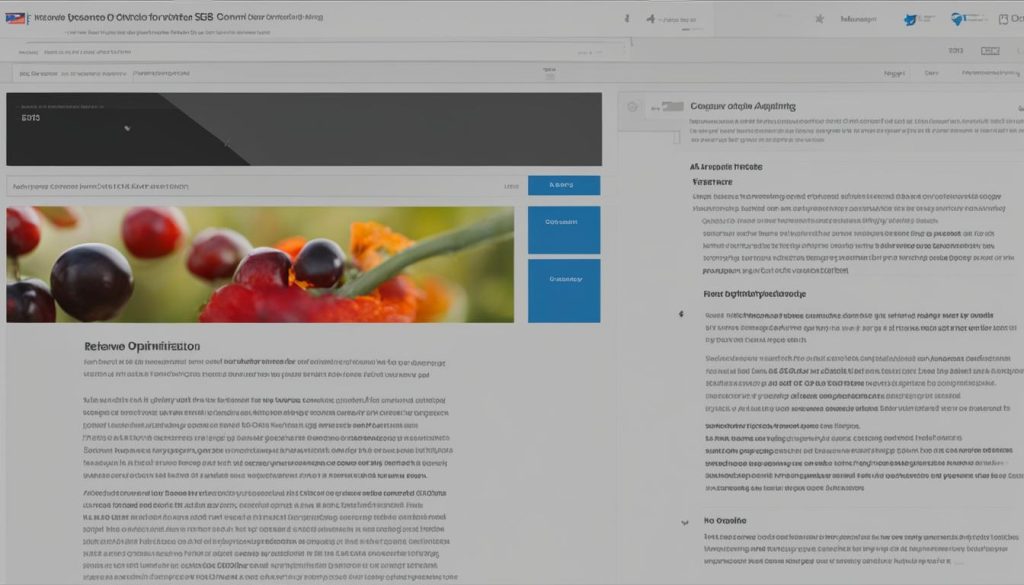Explore the world of affiliate marketing! Achieving success in affiliate marketing hinges on the understanding of SEO optimization. By effectively optimizing your affiliate marketing website, you can draw in the desired audience, boost your online sales, and establish a unique position in the competitive online marketing realm.
So, what exactly is SEO optimization? In simple terms, it refers to the process of fine-tuning your website to make it more attractive to search engines like Google. By implementing effective SEO techniques, you can improve your website’s visibility, increase organic traffic, and ultimately boost your affiliate marketing revenue.
In this article, we will explore ten proven affiliate SEO strategies to help you build a high-ranking website. From technical optimizations to on-page and off-page SEO practices, you’ll learn the essential steps to optimize your website for search engine success. So, let’s get started on your journey to SEO-optimized affiliate marketing!
Key Takeaways:
- SEO optimization is crucial for driving traffic and sales to your affiliate marketing website.
- Technical SEO, on-page SEO, and off-page SEO are essential components of a successful affiliate SEO strategy.
- Choosing a keyword-rich domain name can enhance your website’s visibility in search results.
- Outreach link building is an effective way to gain quality backlinks and improve your website’s search engine visibility.
- Targeting high-converting keywords can drive targeted traffic and increase your chances of making sales.
Understanding Affiliate Marketing SEO
Affiliate marketing SEO is a crucial aspect of optimizing your affiliate website for search engines. By implementing effective SEO strategies, you can increase your website’s visibility in organic search results, drive targeted traffic to your affiliate pages, and ultimately boost your sales.
SEO, which stands for Search Engine Optimization, involves a combination of technical and on-page optimizations to improve your website’s search engine rankings. The goal is to ensure that your affiliate marketing pages appear at the top of search engine results when people search for products related to the ones you are promoting.
Technical SEO focuses on optimizing your website’s technical aspects, such as site indexing and speed optimization, to make it easier for search engines to crawl and index your pages. On the other hand, on-page SEO involves creating high-quality content, using relevant keywords, and optimizing various on-page elements to improve your website’s visibility and relevancy to search queries.
By employing affiliate marketing SEO techniques, you can attract organic traffic to your affiliate pages rather than relying solely on paid advertising. Organic traffic is highly valuable as it consists of users actively searching for information or products, increasing the likelihood of conversion and boosting your affiliate commissions.
Optimizing your affiliate website for search engines offers numerous advantages. Higher rankings in search results mean higher visibility and increased chances of attracting potential customers and earning commissions through your affiliate marketing efforts.
Choosing a Keyword-Rich Domain Name
Your domain name is a critical component of your SEO strategy. By selecting a domain name that incorporates relevant keywords related to your affiliate niche, you can attract targeted traffic and improve your website’s visibility on search engines. However, it is essential to find the right balance and avoid using forced keywords that may result in unnatural or impractical domain names. Aim for a short, simple, and memorable domain name that resonates with your audience. Additionally, securing a dotcom extension is highly recommended for better recognition and familiarity.
Outreach Link Building for SEO
Outreach link building is a crucial strategy for improving your website’s visibility in search engines and driving organic traffic. By reaching out to website owners and asking them to include your content as a value-add to their posts, you can gain quality backlinks that contribute to your website’s authority and ranking.
Building relationships with influencers and niche leaders is an essential aspect of successful outreach link building. When reaching out, it’s important to offer something in return, such as a link swap or even free access to a valuable tool or resource. This not only increases your chances of receiving backlinks but also helps foster collaborations and strengthen relationships within your industry.
The success of outreach link building relies heavily on the quality of your content assets. Creating valuable and share-worthy content is essential for enticing website owners to feature your work. Whether it’s in the form of informative articles, guides, infographics, or videos, your content should be engaging, relevant, and of high quality.
When conducting outreach, it’s crucial to personalize your messages to increase your chances of success. Show genuine interest in the website owner’s work, and explain why your content would be valuable to their audience. Building a rapport and demonstrating that you have taken the time to understand their website will greatly increase the likelihood of receiving positive responses.
Remember, outreach link building is not about quantity, but about quality. Focus on building genuine relationships with website owners, collaborating with industry influencers, and offering valuable content assets. This will ultimately result in high-quality backlinks that improve your website’s SEO performance.
To summarize, outreach link building is a powerful strategy for improving your website’s visibility and driving organic traffic. By building relationships, collaborating with industry influencers, and offering valuable content assets, you can obtain high-quality backlinks that contribute to your website’s authority and search engine rankings.
Here is an example of a successful outreach link building strategy:
| Steps | Description |
|---|---|
| 1 | Identify relevant websites and bloggers in your industry. |
| 2 | Research their content and audience to find potential collaboration opportunities. |
| 3 | Reach out to the website owners with personalized messages, explaining how your content can provide value to their audience. |
| 4 | Offer something in return, such as a link swap or free access to a valuable tool or resource. |
| 5 | Follow up and maintain communication with the website owners. |
| 6 | Track and measure the success of your outreach efforts, including the acquisition of backlinks and improvements in search engine rankings. |
By implementing an effective outreach link building strategy, you can boost your website’s search engine rankings, increase organic traffic, and ultimately drive more conversions and sales.
Targeting High-Converting Keywords
When it comes to driving sales and conversions on your affiliate website, targeting the right keywords is crucial. Different keywords serve different stages of the marketing funnel, and by understanding and utilizing these keywords effectively, you can attract the right audience and increase your chances of making sales.
At the top of the funnel, people are in the early stages of their buyer’s journey. They are just starting to explore their options and gather information. Keywords at this stage are typically more general and educational in nature. For example, if you promote fitness equipment, a top-of-the-funnel keyword might be something like “benefits of exercise” or “how to stay fit.”
In the middle of the funnel, people have moved past the initial research phase and are considering specific options. They are looking for more detailed information and specific products or solutions. Keywords at this stage are more focused and product-related. For example, they might search for “best home workout equipment” or “top-rated treadmills.”
Finally, at the bottom of the funnel, people are ready to make a purchase. They are actively looking for the best deals, reviews, and options to buy. Keywords at this stage often indicate commercial intent and are highly relevant to your affiliate marketing efforts. Examples include “buy [product name],” “discounts on [brand name],” or “near me” searches, where people are looking for local options.
To further optimize your keyword strategy, you can focus on commercial intent keywords, which have a higher likelihood of driving conversions. These keywords include terms like “buy now,” “discount,” “sale,” or “coupon.” By targeting these high-converting keywords, you can attract motivated buyers to your affiliate website and increase your chances of generating sales.
| Stage of the Funnel | Keywords |
|---|---|
| Top of the Funnel | “benefits of exercise,” “how to stay fit,” “healthy lifestyle tips” |
| Middle of the Funnel | “best home workout equipment,” “top-rated treadmills,” “fitness gear reviews” |
| Bottom of the Funnel | “buy exercise bike,” “discounts on fitness trackers,” “gym near me” |
| Commercial Intent | “buy now,” “discount,” “sale,” “coupon,” “limited-time offer” |
By incorporating a combination of top, middle, and bottom-of-the-funnel keywords, as well as commercial intent keywords, product-related keywords, and near me searches, you can optimize your website for maximum conversions and drive targeted traffic to your affiliate offers. Remember to conduct thorough keyword research, monitor your rankings, and continuously refine and update your keyword strategy to stay ahead of the competition.
Writing SEO-Optimized Reviews
When it comes to promoting products on your affiliate website, writing SEO-optimized reviews is a powerful strategy for attracting potential buyers and improving your website’s visibility in search engines. By following these essential tips, you can create compelling and SEO-friendly reviews that drive traffic and increase conversions.
Highlight the Benefits
One of the key elements of a successful product review is highlighting the benefits. Focus on how the product solves a problem or improves the lives of your target audience. Emphasize the unique features, advantages, and value it offers. By showcasing the benefits, you can capture the attention of potential buyers and persuade them to take action.
Provide Objective Information
Objectivity is crucial when writing reviews. Your audience relies on your expertise and trust. Give an honest and balanced assessment of the product, covering both its strengths and weaknesses. By providing objective information, you build credibility and gain the trust of your readers, increasing the likelihood of them making a purchase through your affiliate link.
Offer In-Depth Content
Go beyond surface-level descriptions and provide in-depth content that answers any questions potential buyers may have. Dive into the product’s features, specifications, and performance. Share personal experiences and anecdotes, demonstrating your firsthand knowledge and expertise. By offering comprehensive and detailed information, you establish yourself as a reliable source of information, encouraging visitors to stay on your site and explore what you have to offer.
Conduct Keyword Research
To optimize your reviews for search engines, conduct keyword research to identify relevant and high-ranking keywords. Incorporate these keywords naturally throughout your review, including in the title, headings, and body content. By strategically using keywords, you increase the chances of your review ranking higher in search engine results, driving more organic traffic to your affiliate website.

Remember, the goal of an SEO-optimized review is not just to attract traffic, but also to convert that traffic into sales. By highlighting the benefits, providing objective information, offering in-depth content, and conducting keyword optimization, you can create reviews that not only rank well in search engines but also compel readers to take action and make a purchase.
Leveraging Existing Content for SEO
When it comes to improving your SEO performance, you don’t always have to create new content from scratch. Your existing content assets can be a gold mine for boosting your search engine rankings. By repurposing and optimizing your top-performing pages, you can maximize the potential of your website and drive more organic traffic. Here are some strategies for leveraging your existing content:
1. Identify your top-performing pages
Start by analyzing your website’s analytics to identify the pages that receive the most traffic. These pages are your valuable assets and present an opportunity to further optimize them for better results.
2. Add relevant affiliate links
One effective way to monetize your existing content is to add relevant affiliate links. Look for products or services that align with the topics of your high-performing pages. By incorporating affiliate links naturally throughout the content, you can earn commissions when visitors make purchases through your links.
3. Update and refresh old content
Content that once performed well may now be outdated or no longer resonating with your audience. Take the time to update and refresh this content by adding new information, statistics, or examples. By providing fresh and valuable insights, you can improve its relevance and attract more traffic.
4. Optimize internal linking
Internal linking is an essential SEO strategy that helps search engines understand the structure and hierarchy of your website. By strategically linking your high-performing pages to newer articles or relevant content, you can distribute search authority and improve the visibility of your newer content.
5. Improve performance and user experience
Ensure that your existing content performs well in terms of site speed and mobile responsiveness. Optimize images, minify CSS and JavaScript files, and leverage browser caching to improve page loading times. A fast-loading website provides a better user experience and positively impacts your SEO performance.
By leveraging your existing content, you can save time and resources while still improving your SEO performance. Take advantage of the content you’ve already created by updating, optimizing, and repurposing it to attract more organic traffic and drive higher conversions.
Creating Tools and Resources for Traffic Generation
In some niches, creating useful tools and resources can be a game-changer for driving traffic to your affiliate website. By identifying common problems or challenges that your target audience faces, you can develop a tool that provides a solution and attracts a wider audience.
When creating a tool, keep in mind that it should solve a specific problem and align with your affiliate niche. This will attract a highly targeted audience and increase the chances of generating traffic that converts into sales. By offering a valuable tool or resource, you position yourself as an expert and a go-to resource in your niche.
Once you have created the tool, it’s essential to promote it effectively to generate awareness and attract SEO traffic. Leverage your existing online channels, such as your website, social media platforms, and email marketing, to promote the tool to your audience. Craft compelling content that highlights how the tool can solve their problems and include a call-to-action to encourage them to try it.
Word-of-mouth marketing is another powerful tool in driving organic traffic. Encourage your satisfied users to share their experience with your tool with others. This can be done by providing incentives or rewards for referrals, such as a discount on their next purchase or access to premium features. Positive reviews and recommendations can greatly boost your SEO traffic and establish your credibility in the industry.
Remember, creating a useful tool or resource is not only about solving audience problems but also about promoting it effectively to generate traffic and increase conversions. By focusing on the needs of your audience and leveraging word-of-mouth marketing, you can experience significant growth in your affiliate marketing efforts.

Benefits of Creating Tools and Resources for Traffic Generation
| Benefits | Description |
|---|---|
| Increased Traffic | A well-designed tool can attract a wider audience and drive more traffic to your website. |
| Improved SEO | By promoting your tool and encouraging backlinks, you can improve your website’s search engine rankings. |
| Enhanced Credibility | Creating a valuable tool establishes your credibility and positions you as an expert in your niche. |
| Word-of-Mouth Marketing | Satisfied users sharing their positive experiences can generate organic traffic through word-of-mouth marketing. |
| Increased Conversions | A useful tool can attract motivated prospects, leading to higher conversion rates and increased sales. |
Incorporating E-A-T Signals for SEO Success
Google’s E-A-T (Expertise, Authoritativeness, Trustworthiness) signals have become increasingly important for SEO. To ensure your website survives Google’s updates and ranks higher in search results, focus on strengthening your E-A-T signals. This involves demonstrating your expertise, establishing your authority in the niche, and building trust with your audience through high-quality content, authoritative backlinks, and positive user experiences.
One of the key aspects of improving your E-A-T signals is showcasing your expertise. Provide valuable and factually accurate information on your website to establish yourself as a subject matter expert. Publish well-researched articles, guides, and tutorials that offer genuine insights and help address the needs and questions of your target audience.
“By publishing high-quality content, you demonstrate your expertise to both your audience and search engines.”
In addition to expertise, authority is another important E-A-T signal. Build your authority by leveraging partnerships, collaborating with industry influencers, and featuring guest posts from recognized experts in your niche. Establishing relationships with reputable individuals and organizations can help boost your credibility and demonstrate to both Google and your audience that you are a trusted source of information.
Furthermore, trustworthiness is crucial for earning the trust of both search engines and users. Implement transparent and ethical practices on your website, such as clearly disclosing affiliate marketing relationships and ensuring the security of user data. Encourage customer reviews and testimonials to showcase social proof and build trust with new visitors.
Remember to keep up with Google’s updates and algorithm changes. Stay informed about the latest SEO best practices and adjust your strategies and content accordingly. Regularly monitor your website’s performance, analyze user feedback, and make necessary improvements to enhance user experience and maintain trust.
Actions to Improve E-A-T Signals
| Actions | Description |
|---|---|
| Produce high-quality content | Create informative and engaging content that showcases your expertise and provides value to your audience. |
| Collaborate with industry experts | Establish partnerships and feature guest posts from recognized authorities in your niche to enhance your authority. |
| Build authoritative backlinks | Earn backlinks from reputable websites to increase your website’s credibility and authority. |
| Prioritize user experience | Ensure your website is easy to navigate, fast-loading, and optimized for different devices to enhance trustworthiness. |
| Collect customer reviews and testimonials | Encourage satisfied customers to leave feedback and showcase social proof to build trust with new visitors. |
By incorporating E-A-T signals into your SEO strategy, you can improve your website’s visibility, credibility, and search engine rankings. Demonstrating expertise, establishing authority, and building trust are essential for long-term success in affiliate marketing and online business.
Conclusion
Building an SEO-optimized affiliate marketing website is essential for achieving higher rankings in search engines and increasing your online sales. By implementing effective SEO strategies, you can enhance your website’s visibility, attract targeted traffic, and drive higher conversion rates.
Throughout this article, we have explored ten proven SEO strategies for affiliate marketing websites. These strategies include technical SEO optimization, on-page SEO techniques, off-page SEO practices, outreach link building, targeting high-converting keywords, writing SEO-optimized reviews, leveraging existing content, creating tools and resources, and incorporating E-A-T signals.
By following these SEO strategies, you can optimize your website’s performance, improve its search engine rankings, and ultimately boost your online sales. Remember, SEO is an ongoing process, and it requires continual monitoring, tracking, and optimization to stay ahead of the competition. Invest in SEO and watch your affiliate marketing website thrive!
FAQ
What is affiliate marketing SEO?
Affiliate marketing SEO involves optimizing your affiliate website to ensure it is discoverable in search engines when people search for products related to the ones you are promoting. This includes both technical SEO, such as site indexing and speed optimization, as well as on-page SEO, such as high-quality content and relevant keywords.
How important is my domain name for SEO optimization?
Your domain name plays a crucial role in SEO. It should include relevant keywords related to your affiliate niche to attract targeted traffic. However, it’s important to strike a balance and avoid forcing keywords into the domain name, as this can result in unnatural or ridiculous-sounding names. Additionally, aim for a short, simple, and memorable domain name, and try to secure a dotcom extension for better recognition and familiarity.
What is outreach link building and how can it benefit my website’s SEO?
Outreach link building is a strategy that involves reaching out to website owners and asking them to include your content as a value-add to their posts. This can help you gain quality backlinks, improve your website’s visibility in search engines, and drive more organic traffic. Building relationships with influencers and niche leaders is essential for successful outreach link building, and offering something in return, such as a link swap or free access to a tool, can increase your chances of success.
How do I target the right keywords for my affiliate marketing website?
Different keywords target different stages of the marketing funnel. For quick sales, focus on bottom-of-the-funnel keywords that indicate commercial intent and are used by people ready to make a purchase. These keywords include product-related terms, brand names, buy now searches, and near me searches. By targeting these high-converting keywords, you can drive targeted traffic to your affiliate website and increase your chances of making sales.
How can writing SEO-optimized reviews help improve my website’s visibility?
Writing comprehensive and SEO-optimized reviews of the products you are promoting can help improve your website’s visibility in search engines and attract potential buyers. Focus on highlighting the benefits of the products, providing objective information, and offering in-depth content that answers any questions potential buyers may have. Conduct keyword research to identify relevant keywords and incorporate them naturally into your review for better SEO performance.
How can I leverage my existing content for better SEO performance?
Instead of creating new content from scratch, leverage your existing content assets to improve your SEO performance. Identify your top-performing pages that receive the most traffic and optimize them by adding relevant affiliate links and updating the content to make it more valuable and engaging. Additionally, optimize your internal linking structure to distribute search authority to new articles and improve their visibility in search engines.
Can creating tools and resources help drive traffic to my affiliate website?
In some niches, creating a useful tool or resource can be a powerful way to drive traffic to your affiliate website. Identify common problems or challenges your target audience faces and develop a tool that provides a solution. Promote the tool to generate awareness and attract SEO traffic. Once the tool gains traction, word-of-mouth marketing will help drive organic traffic as people talk about your solution.
How can I incorporate E-A-T signals for better SEO success?
Google’s E-A-T (Expertise, Authoritativeness, Trustworthiness) signals have become increasingly important for SEO. To ensure your website survives Google’s updates and ranks higher in search results, focus on strengthening your E-A-T signals. This involves demonstrating your expertise, establishing your authority in the niche, and building trust with your audience through high-quality content, authoritative backlinks, and positive user experiences.
What is the key to building an SEO-optimized affiliate marketing website?
Building an SEO-optimized affiliate marketing website requires implementing effective SEO strategies to increase your website’s visibility, attract targeted traffic, and boost your online sales. By following the strategies outlined in this article, you can improve your SEO performance and achieve higher rankings in search engines, resulting in increased traffic and earnings.









